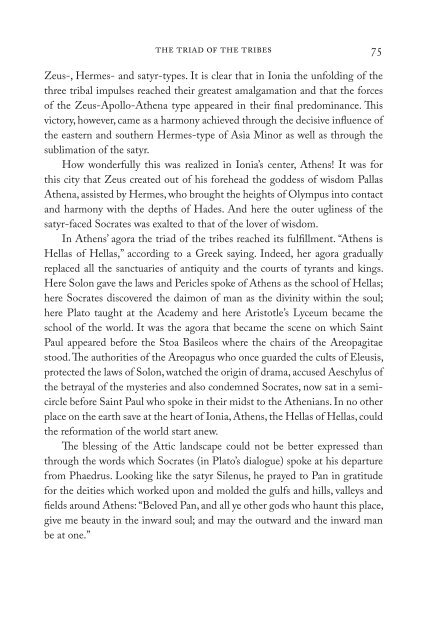The Gospel of Hellas - Research Institute for Waldorf Education
The Gospel of Hellas - Research Institute for Waldorf Education
The Gospel of Hellas - Research Institute for Waldorf Education
Create successful ePaper yourself
Turn your PDF publications into a flip-book with our unique Google optimized e-Paper software.
the triad <strong>of</strong> the tribes<br />
Zeus-, Hermes- and satyr-types. It is clear that in Ionia the unfolding <strong>of</strong> the<br />
three tribal impulses reached their greatest amalgamation and that the <strong>for</strong>ces<br />
<strong>of</strong> the Zeus-Apollo-Athena type appeared in their final predominance. This<br />
victory, however, came as a harmony achieved through the decisive influence <strong>of</strong><br />
the eastern and southern Hermes-type <strong>of</strong> Asia Minor as well as through the<br />
sublimation <strong>of</strong> the satyr.<br />
How wonderfully this was realized in Ionia’s center, Athens! It was <strong>for</strong><br />
this city that Zeus created out <strong>of</strong> his <strong>for</strong>ehead the goddess <strong>of</strong> wisdom Pallas<br />
Athena, assisted by Hermes, who brought the heights <strong>of</strong> Olympus into contact<br />
and harmony with the depths <strong>of</strong> Hades. And here the outer ugliness <strong>of</strong> the<br />
satyr-faced Socrates was exalted to that <strong>of</strong> the lover <strong>of</strong> wisdom.<br />
In Athens’ agora the triad <strong>of</strong> the tribes reached its fulfillment. “Athens is<br />
<strong>Hellas</strong> <strong>of</strong> <strong>Hellas</strong>,” according to a Greek saying. Indeed, her agora gradually<br />
replaced all the sanctuaries <strong>of</strong> antiquity and the courts <strong>of</strong> tyrants and kings.<br />
Here Solon gave the laws and Pericles spoke <strong>of</strong> Athens as the school <strong>of</strong> <strong>Hellas</strong>;<br />
here Socrates discovered the daimon <strong>of</strong> man as the divinity within the soul;<br />
here Plato taught at the Academy and here Aristotle’s Lyceum became the<br />
school <strong>of</strong> the world. It was the agora that became the scene on which Saint<br />
Paul appeared be<strong>for</strong>e the Stoa Basileos where the chairs <strong>of</strong> the Areopagitae<br />
stood. <strong>The</strong> authorities <strong>of</strong> the Areopagus who once guarded the cults <strong>of</strong> Eleusis,<br />
protected the laws <strong>of</strong> Solon, watched the origin <strong>of</strong> drama, accused Aeschylus <strong>of</strong><br />
the betrayal <strong>of</strong> the mysteries and also condemned Socrates, now sat in a semicircle<br />
be<strong>for</strong>e Saint Paul who spoke in their midst to the Athenians. In no other<br />
place on the earth save at the heart <strong>of</strong> Ionia, Athens, the <strong>Hellas</strong> <strong>of</strong> <strong>Hellas</strong>, could<br />
the re<strong>for</strong>mation <strong>of</strong> the world start anew.<br />
<strong>The</strong> blessing <strong>of</strong> the Attic landscape could not be better expressed than<br />
through the words which Socrates (in Plato’s dialogue) spoke at his departure<br />
from Phaedrus. Looking like the satyr Silenus, he prayed to Pan in gratitude<br />
<strong>for</strong> the deities which worked upon and molded the gulfs and hills, valleys and<br />
fields around Athens: “Beloved Pan, and all ye other gods who haunt this place,<br />
give me beauty in the inward soul; and may the outward and the inward man<br />
be at one.”

















